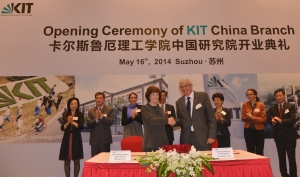Researchers from China and the KIT have been cooperating successfully in scientific cooperation and innovation projects and in the promotion of young scientists for many years. From now on, KIT will present its activities under the roof of its newly opened branch office in the city of Suzhou in the Chinese province of Jiangsu. This office is to be used as an interdisciplinary platform, incubator, and contact office of the KIT for industry and science in China. The office in Suzhou was opened officially today in the presence of about 200 invited guests from science, industry, and politics of both countries.
“The new KIT representation in China will serve as an interdisciplinary platform to enhance cooperation projects between the KIT and its Chinese partners in the areas of education, research, and innovation,” says Holger Hanselka, President of KIT. “It will support academic exchange and joint research and development relating to current topics. This cooperation of both countries will give rise to big synergy potentials. “The KIT already cooperates with more than 30 partner universities at 22 locations in China. The spectrum of activities extends from graduate schools to joint laboratories to close-to-industry projects.
“The permanent representation of KIT in one of the most important countries is to provide for the direct and uncomplicated access to local partners and their needs,” explains Gisela Lanza, China Commissioner of the KIT and holder of a chair at the KIT Institute of Production Science (wbk). Workshops, seminars, and conferences on strategic fields of research of KIT will be organized. This year, the office will help organize an alumni seminar on global production, a seminar on mobility systems is planned next year. For students, summer schools and exchange programs will be established. Last, but not least, intercultural communication will be strengthened.
For the strategic activities of the KIT in China, Suzhou is a rather favorable location. A strategic partnership between the province of Jiangsu and the state of Baden-Württemberg has been existing for decades now. Many branch offices of German companies are located in the Suzhou Industrial Park (SIP). Vice versa, the KIT is considered an attractive partner by Chinese researchers due to its outstanding research activities and excellent networking in Baden-Württemberg.
Numerous industrial and academic networks in the areas of e.g. nanotechnology, production engineering, mobility, and mechanical engineering have been established in the region. Since 2006, KIT has been active in many of these networks under the roof of the Global Advanced Manufacturing Institute (GAMI). In line with the three defined KIT tasks of research, innovation, and teaching, GAMI that was founded by Lanza enhances the understanding of global production structures and develops new, robust, and controlled production networks for industrial companies in accordance with local framework conditions. Advanced qualification, training, and coaching are important elements offered by GAMI to industry partners in order to sustainably improve the supply chain. GAMI presently has 20 Chinese employees, who graduated in engineering at the KIT. It is also involved in current research projects of the KIT.

